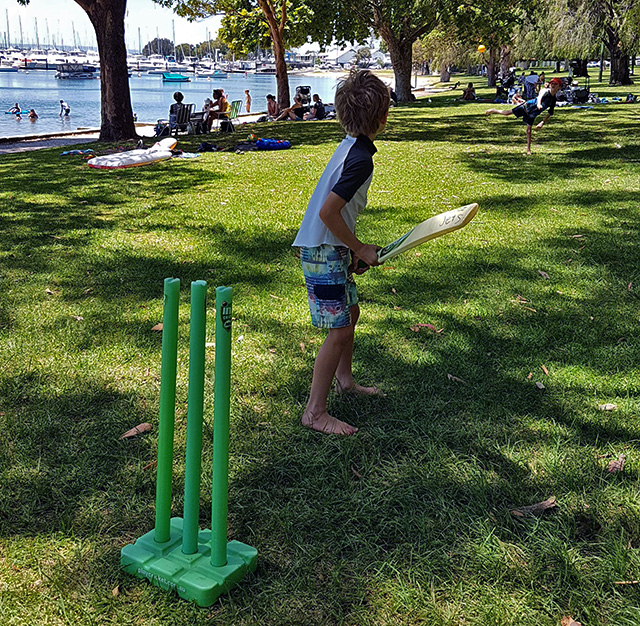Backyard cricket is part of many Australian's upbringing. The rules of backyard cricket will vary with every backyard (or park, playground or street), but here is a list that many a game is based on.
 ball tracking
ball tracking - One hand off the house: Catches must be taken one-hand if the ball comes off the house/tree/fence.
- Six and out: If you hit it over the fence you're out and you have to get the ball.
- No LBWs: Too contentious, unless dad agrees to umpire.
- You can't go out first ball: This is to stop your kid brother from blubbing or to give granny a chance.
- Last man's tucker: You can bat by yourself if you are the last remaining batsman.
- Tip-n-run: You have to run if you hit it.
- Magic wickets: You can run out a batsman batting alone by hitting the wicket at either end.
- Auto Wicky: if you play in front of a wall and nick the ball behind you, you can be given out assuming a wicket keeper would have caught it.
- Automatic runs: If you hit certain backyard landmarks - a fence or shed perhaps - you are awarded a prearranged number of runs.
- One hand one bounce: Catches can be taken one-hand if the ball only bounces once
Related Pages
- See also French Cricket rules
- Lyrics to "I Made A Hundred In The Backyard At Mum's"
- Poem about Backyard Cricket
Old Comments
Commenting is closed on this page, though you can read some previous comments below which may answer some of your questions.
- Great post, and our next door neighbors are really big into cricket. And I still don't quit understand the whole concept of the game. However my wife and I are thinking about getting a fence for our backyard so we don't have to worry about our neighbors hitting the balls into our yard. And on occasion having the balls hit our house. Cooper Pie (2013)
- Tippit ( tip or touch the ball) (&) he runs = tip it, he runs' = becoming 'tippity runs'. Satchin (2013)
- Re: # six and out rule. A visitor to this page asks if the ball goes over the fence, but bounces first, is it out? It is literally not a 6 because it bounced. This is one of the many clarifications that will need to be sorted out before each game. The main reason for a six-and-out rule is that someone has to go over the fence and get the ball, so if the ball gets there, not matter how, maybe it should be out. However, this leads to the potential situation where a fielder may leave the ball to bounce and subsequently go over the fence.
- Re: # six and out rule. Robert asks "When you hit the ball and if you hit someone in the head and it goes over fence is that out?" The same may be asked if the ball hits any part of the fielder's body and goes over the fence. In an official cricket game, a ball coming to the fielder on the full, then bouncing off and over the fence will be a six. For the same reason you may also give it six and out in backyard cricket. As mentioned above, the main reason for a six-and-out rule is that someone has to go over the fence and get the ball, so if the ball gets there, not matter how, maybe it should be given out.


 Current Events
Current Events